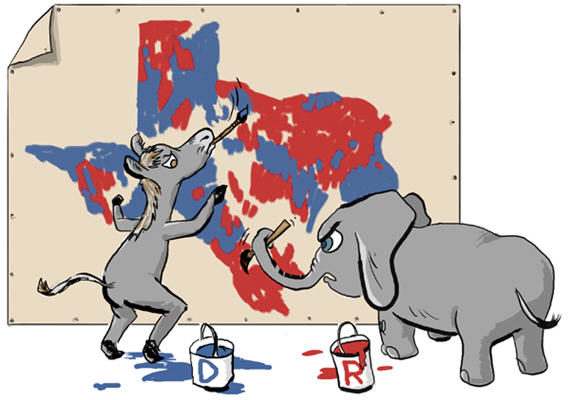Pennsylvania Ponders Bold Democrat-Screwing Electoral Plan
Republicans have a plan to wrest half of the Keystone State's electors from Obama.
Kevin Drum decries the Republican tactic of “actively subvert[ing] the infrastructure and funding that allow[s] the opposing party to exist at all.” He cites tort reform and anti-union legislation, which strikes me as perfectly explainable by legitimate policy goals; voter ID laws, which are perfectly explainable by widely existing if irrational fears; and mid-decade redistricting and institutionalizing the filibuster, both of which I agree are wrong and have repeatedly condemned.
The latest example, though, is intriguing. Citing his MoJo colleague Nick Baumann (“The GOP’s Genius Plan to Beat Obama in 2012“), he sees “a cynical ploy to change the electoral map to arbitrarily favor the Republican Party” about which “There’s really no one left who might object to this merely out of a decent respect for institutional integrity and fairmindedness.”
This would ordinarily be a clarion call to people like myself, who not only condemned the Texas mid-term redistricting but also the recall effort against Democrat Gray Davis. But I’m not sure that this isn’t actually just smart political gamesmanship:
Under the Republican plan—which has been endorsed by top Republicans in both houses of the state’s legislature, as well as the governor, Tom Corbett—Pennsylvania would change from this system to one where each congressional district gets its own electoral vote….Under the Republican plan, if the GOP presidential nominee carries the GOP-leaning districts but Obama carries the state, the GOP nominee would get 12 electoral votes out of Pennsylvania, but Obama would only get eight—six for winning the blue districts, and two (representing the state’s two senators) for carrying the state. This would have an effect equivalent to flipping a small winner-take-all state—say, Nevada, which has six electoral votes—from blue to red. And Republicans wouldn’t even have to do any extra campaigning or spend any extra advertising dollars to do it.
[…]
It doesn’t necessarily end there. After their epic sweep of state legislative and gubernatorial races in 2010, Republicans also have total political control of Michigan, Ohio, and Wisconsin, three other big states that traditionally go Democratic and went for Obama in 2012. Implementing a Pennsylvania-style system in those three places—in Ohio, for example, Democrats anticipate controlling just 4 or 5 of the state’s 16 congressional districts—could offset Obama wins in states where he has expanded the electoral map, like Virginia, North Carolina, Colorado, or New Mexico. “If all these rust belt folks get together and make this happen that could be really dramatic,” says Carolyn Fiddler, a spokeswoman for the Democratic Legislative Campaign Committee, which coordinates state political races for the Dems.
Presumably, though, Democrats could fight back by doing the same sort of things in states they control. And, certainly, they’ve not been above changing the rules in their favor, for example dumping candidates for statewide office and then changing the replacement rules to suit their needs or stripping and then re-instituting the power of the Massachusetts governor to appoint replacement Senators based on whether Mitt Romney held the power.
Beyond that 1) states have long held the power to allocate their Electors as they choose; 2) Maine and Nebraska have long done this, so it wouldn’t break any new ground; 3) winner-take-all is pernicious, especially in swing states, which by definition have closer contests; 4) the rules would be known well in advance of the general election campaign; and 5) the partisan impact is neither permanent nor certain.
The last of those is by no means least. It’s by no means certain that, whatever the intent, this will advantage Republicans. Pennsylvania has 7.8% unemployment. An August Quinnipiac poll shows a majority of Pennsylvanians believing Obama does not deserve a second term, Mitt Romney beating Obama, and Obama in a statistical tie with Rick Santorum! It’s at best even odds that Obama takes the state. So, this tactic could actually do Obama a favor in 2012.
Drum’s own state, California, was actually considering doing this back in 2007. After being a reliable Republican state forever, it’s been a reliable Democratic state since 1992. As a result, the state with by far the largest population is an afterthought in the campaign. The initiative failed, as best I could tell from reading the papers at the time, mostly for logistical rather than philosophical or partisan reasons.
Furthermore, I’ve been writing for more than five years now about a plan to abolish the Electoral College by stealth called the Campaign for a National Popular Vote. Essentially, it’s a scheme to get enough states to elect a president (i.e., a total of 270 Electoral votes) to band together and vote for whichever candidate wins the national popular vote, regardless of who won their state or by what margin. Massachusetts signed onto it last July, joining Illinois, New Jersey, Hawaii, Maryland, and Washington. That would be a much more radical reform of the system, upending more than two centuries of history. And it’s perfectly fair game.
I’m all for re-enfranchising voters who happen to be of the minority party in their states. In the best of all worlds, we’d adopt the change all at one time. Failing that, however, I don’t see why states whose electorates put one party in charge of all the levers of power can’t decide to be first movers in the interest of advantaging said party.
Headline shamelessly stolen from Dave Weigel.







The only real reason our presidential electoral system works the way it does is by happy accident combined with tradition. So I can’t really muster any actual criticism of this move. There is nothing intentional or necessary about the winner-take-all system. And the system as a whole is subject to all sorts of tomfoolery. The most obvious problem being unfaithful electors, a more unseen problem being a closely contested election that leaves no time for recounts before the elector meeting (florida in 2000 was bad, but it could be worse).
That said, the electoral college should be gotten rid of completely and a direct vote done. First past the post elections should also be done away with.
Seems like one of those “too clever by half” moves. As you point out, it might undercut a GOP victory in PA and cost the GOP the election.
It would also seriously undermine the importance of PA as a state that candidates would fight over. Instead of a prize of 20 electoral votes, the candidates would assume that most all of the votes were already locked up for them or their opponents, with only a few districts and the “at large” seats up for grabs. Much wiser to spend the time and energy next door in the state that promises a winner-take all pool.
I don’t see why states whose electorates put one party in charge of all the levers of power can’t decide to be first movers in the interest of advantaging said party.
Yes, because Democracy is healthiest when it’s reduced to a winner-take-all affair where anyone who takes power breaks every tradition and custom to benefit themselves and punish their enemies. There’s no way that could ever lead to anything at all troublesome.
Mike
@Tano: That’s been my take on the politics of it, whether in California 2007 or this now. Done alone, it may have short-term partisan advantage but deleverages the state’s power.
James –
Unfortunately, what you’re seeing is the gradual results of the GOP’s four decade slide. As the older white rural vote shrinks and the younger, ethnic vote increases, the GOP is having to use more and more “tricks” to garner popular support in the most miniscule of ways.
In 2000, the GOP lost the popular vote, and if not for the Florida butterfly ballot, they would have lost the Electoral College as well.
In 2004, it was the mobilization of Christian Conservatives with the various Gay Marriage and Social Conservative Issues on the ballots in many swing states that won it for Bush.
In 2008, it was Latinos and African Americans that put states like North Carolina, Virginia, Colorado, and Nevada into play.
Eligible Latino voters have increased 23% since 2008. So how will the GOP respond? It’s predictable. They’re instituting various “Voter ID Measures” (which do nothing but disenfranchise certain Democratic voters) and re-writing the rules to benefit their dying brand.
What happens when the GOP finally runs out of such “games” in 2020 or 2024 and can’t gather up a winning coalition due to demographics?
The part of this I really don’t like is the linking to congressional districts, as widespread adoption of this would inevitably result in even worse gerrymandering than we have now. Also, I wonder why the GOP didn’t propose this in Florida or Texas.
I generally support the Electoral College but am at least sympathetic to the notion of using the popular vote to decide Presidential elections. If all states allocated electoral votes by district it would essentially split the difference between the established Electoral College and the popular vote.
However, I am not sure I would be comfortable changing the rules for the 2012 election, even if it might help my preferred candidate win. I would prefer to implement something like this well ahead of time, such as for 2016. The best case for this bill is that it would take effect 12 months ahead of an election, and I would prefer both parties have a proper chance to plan for any campaign strategies, not have to deal with this on the fly and end up in court after the election.
@David M:Real easy, Texas as a winner take all proposition gives all the EVs to the Republicans (or will for the next fifteen to twenty years at which point this proposal becomes attractive to Republicans looking to mitigate their demographic decline) and Florida is a state that Republicans have a good chance of grabbing all the EVs in anything other than a very bad Republican year.
@EddieInCA:
How is convincing more people to vote for you by campaiging on the issues they care about a “trick”? Unless you’re starting from the axiom that only Democrat wins are legitimate and thus any Republican win is prima facia based on shenanigans?
Sometimes I think we shuld just go to the popular vote and end all this nonsense! It is from “War of the Roses” and we just subsitute politicians for lawyers. Whas is 500 politicians at the bottom of the ocean? A oood start!
@EddieInCA:
Well, the idea being floated by some is to re-restrict voting to people who own land, or who don’t get a full refund of income taxes, or who are or have ever been employed at any level of government (military excluded).
There’s always more gaming of the system to be done.
The biggest issue I have with this one is (as mentioned above) is that this encourages gerrymandering, which encourages hyper partisan candidates running in uncompetitive elections, which encourages further distrust in government.
@MM: First, Maine and Nebraska have done this for years with no complaints. Second, there are far, far stronger incentives to Gerrymander for congressional districts than influencing presidential elections. Which is why they’re already as Gerrymandered as the Supreme Court will allow.
@David M:
The part of this I really don’t like is the linking to congressional districts
Ding, ding, ding. We have a winner.
This is the problem. Dividing the EC votes to match the popular vote % would be fine, IMO.
@Tano: Unlikely to cost the Republicans the White House for if they were to win a majority of votes in Pennsylvania, then they are mostly likely to have won a majority of votes and all of the EVs from Ohio, Michigan, Indiana, Missouri, North Carolina and Virginia as well based on demographic considerations.
This is a screw the Dems maneuver as the GOP has way more paths to assembling 271 EVs with 0 from Pennsylvania than Democrats have to get to 271 with only 8 from PA.
It’s predictable. They’re instituting various “Voter ID Measures” (which do nothing but disenfranchise certain Democratic voters) and re-writing the rules to benefit their dying brand
Nice cut and paste from stupid.com
Keep whistling past the graveyard. Yesterdays results will seem like the first quarter score on election day 11/12.
@bandit:
Thanks for letting us all know what site you visit.
@Stormy Dragon: How is convincing more people to vote for you by campaiging on the issues they care about a “trick”?
Because the people pushing the laws were not themselves in any way christian, and they know quite well that such laws will ultimately be struck down. It was a a divisive ploy by a cynical party than has zero governing achievements on which to run. Enacting unconstitutional laws at the state level is not a policy position.
It’s a temper tantrum, and it’s name is ALEC. Hint to the GOP: adopt policies which unite the country — the WHOLE country.
@James Joyner:
The “no complaints” part doesn’t seem to be true, at least in the case of Nebraska:
http://journalstar.com/news/local/govt-and-politics/article_b05a487c-fbae-11de-b9c2-001cc4c002e0.html
Actually it is you who is doing that, as people like you become a smaller and smaller minority…
@ratufa: I haven’t followed the internal politics of it. But it never gets more than footnote mention in poli sci or media discussions of the process.
Worth noting that there was an effort to do this in Colorado as recently as 2004 (when it was a Republican state). Shockingly, supporters of President Bush (who won the state in 2000 and was expected to win it in 2004) thought it was a bad idea and opponents of President Bush thought it was a good idea. It was a referendum and failed.
James, I can’t see this as anything other than proof that the Republicans will screw their electorate to put party over constituents. Like you, I think we should have popular election rather than an electoral college. I also think baseball’s Designated Hitter rule is an abomination. But if I’m playing in the AL, I don’t unilaterally put myself at a disadvantage by putting my pitcher at bat. Same with this. Republicans are putting their own state at a unilateral disadvantage by going to this method. Any other state with 20 votes could use their influence to get candidates in the state making promises to help them (good or bad, those are the rules of the game). Most elections in PA are close, so we are talking about maybe a zero, one or two vote differential. So who is going to spend any political capital on PA when they may have less of an impact on the election than Wyoming?